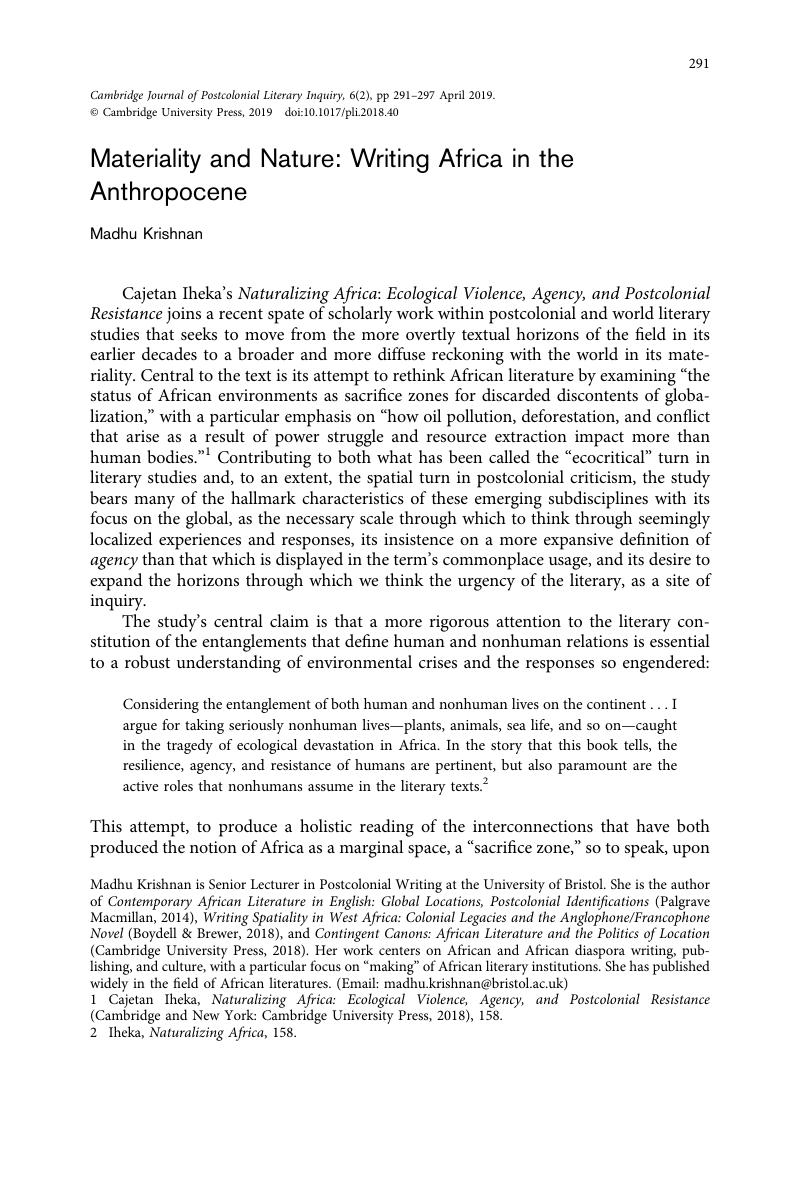Published online by Cambridge University Press: 26 March 2019

1 Iheka, Cajetan, Naturalizing Africa: Ecological Violence, Agency, and Postcolonial Resistance (Cambridge and New York: Cambridge University Press, 2018), 158 Google Scholar .
2 Iheka, Naturalizing Africa, 158.
3 Iheka, Naturalizing Africa, 17–18.
4 Iheka, Naturalizing Africa, 1.
5 Iheka, Naturalizing Africa, 127.
6 Flatschart, Elmar, “Crisis, Energy, and the Value Form of Gender: Towards a Gender-Sensitive Materialist Understanding of Society-Nature Relations,” in Materialism and the Critique of Energy, eds. Brent Ryan Bellamy and Jeff Diamanti (Chicago: MCM Publishing, 2018), 121–158 Google Scholar , esp. 139.
7 Flatschart, “Crisis, Energy, and the Value Form of Gender,” 141.
8 Iheka, Naturalizing Africa, 126.
9 See for instance, Mies, Maria, Patriarchy and Accumulation on a World Scale: Women in the International Division of Labour 3e (London: Zed, 2014 [1986])Google Scholar .
10 Harvey, David, “The Future of the Commons,” Radical History Review 109 (2011): 101–107 CrossRefGoogle Scholar , esp. 103.
11 Flatschart, “Crisis, Energy, and the Value Form of Gender,” 144.
12 Carmody, Pádraig, The New Scramble for Africa (Cambridge: Polity Press, 2011)Google Scholar .
13 Chakrabarty, Dipesh, “Postcolonial Studies and the Challenge of Climate Change,” New Literary History 43.1 (2012): 1–2 CrossRefGoogle Scholar , cited in Iheka, Naturalizing Africa, 9.
14 Cunha, Daniel, “The Anthropocene as Fetishism,” in Materialism and the Critique of Energy, eds. Brent Ryan Bellamy and Jeff Diamanti (Chicago: MCM Publishing, 2018), 51–72 Google Scholar , esp. 54.
15 See Bond, Patrick, Looting Africa: The Economics of Exploitation (London: Zed Books, 2006)Google Scholar .
16 The debates over who writes African literature, for whom, from where, to where, and how are now so extensive and all-pervasive that I will not cite specific examples here.
17 See for instance Newell, Stephanie, West African Literatures: Ways of Reading (Oxford: Oxford University Press, 2006)Google Scholar .